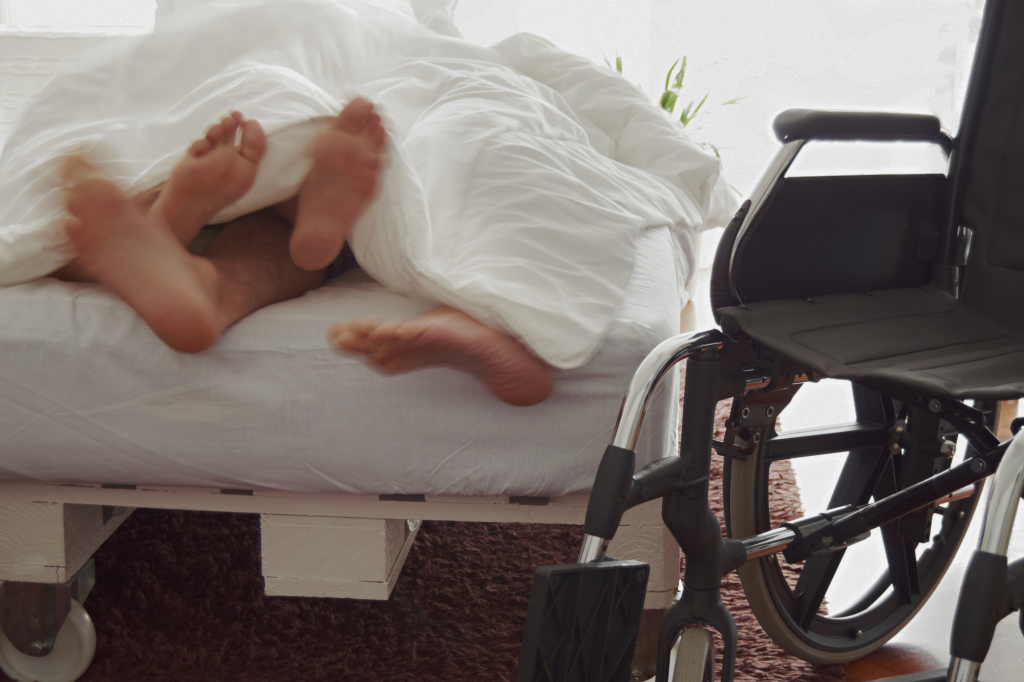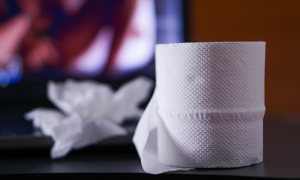
Dildos to the Dump!
In this essay, certified sexuality counselor Evelyn Resh reflects on how our sex lives and perceptions of pleasure change over time.

Sex is good for you! Our bodies thrive on the chemicals released during orgasm, so a healthy sex life is part of a healthy body. We need to think of sexual health beyond the mere absence of disease: sexual pleasure and satisfaction are essential to our wellbeing.
There are many ways to experience sexual pleasure, and you don’t even need a partner. Masturbation is normal, healthy, and fun! It reduces stress, is associated with better sleep, can ease discomfort during periods, and is a great way to explore what feels good to you. Just enjoy.
We’ve all found it awkward when the topic of “down there” comes up. That’s no surprise, since society puts so much shame, stigma, and pressure on, well, you know… s-e-x. We don’t have to whisper about sex and pleasure, we just need to savor it!
With partners, communication is key. The way we each experience pleasure is different, and the same goes for our comfort levels and boundaries. Consent – given freely, enthusiastically, and continuously – is a must. Learn more about starting the conversation with a partner because there is much to talk about. It’s all there for you to explore: fantasies, desires, what feels good and what doesn’t.
Something else to discuss is contraception and safer sex. There are many options to prevent unwanted pregnancies, but condoms are the only one that, when used correctly and consistently, protect against pregnancy and STIs.
It’s all about finding the condom that’s the best fit. Some are snug, some fit more loosely, others have ribs and dots to enhance a partner’s pleasure. (Hmm, is there any chance caring about a partner’s pleasure might lead to more frequent and better sex? Imagine that.) Sex with condoms is fantastic and fulfilling. Don’t take our word for it: a study with men and women found that sex is pleasurable and satisfying whether condoms are used or not.
Whether sex is solo, with a partner, or both, ASHA has collected resources designed to enhance pleasure and maximize the mental and physical benefits. You (and any partners) deserve no less.
Check out three great episodes on pleasure:

In this essay, certified sexuality counselor Evelyn Resh reflects on how our sex lives and perceptions of pleasure change over time.

Featuring interviews with medical professionals and experts in the field of sexuality, ASHA’s Sex+Health podcast aims to offer information and resources to with the goal of helping people take charge of their sexual health.

The number one complaint of women that I see for sexuality counseling is that they have no libido – zip, gone, disappeared. Contrary to what many of us assume, this happens to women of all ages and levels of love, attachment, and attraction to their

A new paper suggests that there are biological and evolutionary reasons that we masturbate and looks to our ape ancestors for evidence. There is evidence starting around 40 million years ago that the ancestors of all monkeys and apes did indeed masturbate.

Whether we’re attracted to the opposite gender, the same gender or both, the truth is: We learn how to experience sexual pleasure for pleasure’s sake by understanding our own sexual desires and responses.

Sexual pleasure is always worth celebrating. Sex has been shown to promote better sleep habits, less stress, and more happiness. Our bodies thrive on the chemicals released during orgasm, so a healthy sex life is indeed part of a healthy body.
ASHA believes that all people have the right to the information and services that will help them to have optimum sexual health. We envision a time when stigma is no longer associated with sexual health and our nation is united in its belief that sexuality is a normal, healthy, and positive aspect of human life.
ABOUT
GET INVOLVED
ASHA WEBSITES
GET HELP
© 2025 American Sexual Health Association